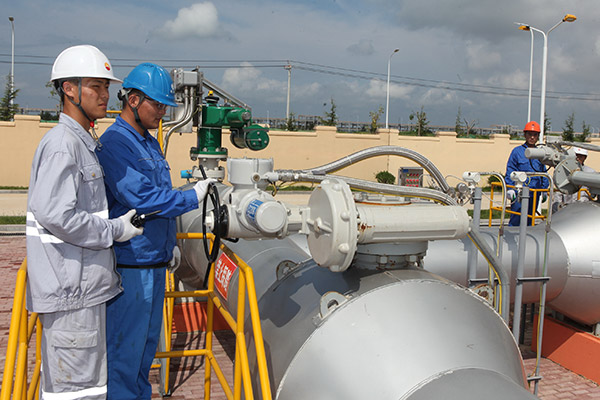Oil futures on the horizon
 |
|
Employees work at Qingdao Dongjiakou Port, which is one of China's largest ports for crude oil transit and storage. [Zhang Jingang/for China Daily] |
New segment will likely stabilize prices and improve efficiency
China, the world's largest crude importer, is moving swiftly toward the introduction of oil futures.
The Shanghai International Energy Trading Center, a subsidiary of the Shanghai Futures Exchange, has completed the fourth trial of the digital platform of the oil futures market in July.
Most of the market players concerned tried it out. Launch would follow the regulatory approval, which is awaited, according to industry insiders.
The China Securities Regulatory Commission has forwarded the SIETC's application to the State Council, the country's Cabinet, for the final green signal.
This means, it is just a matter of time before trading in oil futures takes off in China, said Li Yaqian, general manager of international business at SDIC Essence Futures.
Zhan Sheng, investment director of JZ Investment, said, "The government has to choose a suitable time for the listing, because crude oil futures show clearly a country's demand for oil and could have a bearing on the country's macroeconomic factors."
Agreed Li. "Crude futures will bring about many things-an important tool of price discovery, hedging, risk aversion and arbitrage-for commodity producers, operators and domestic market speculators."
Since 2014, the SFE has been urging the State Administration of Foreign Exchange to allow foreign investors into China's oil futures market whenever it is launched.
"Crude oil is expected to be the first futures segment in China to see foreign traders," said Li.
In fact, some overseas investors have already opened trading accounts during the trials, he said.
He also stressed that crude oil futures will help systematize oil pricing. Futures will have a significant bearing on oil prices, experts said.
That's because uncertainty and wild price fluctuations, which bedevil the spot market currently, would be reined in by the futures market.
Since the futures market would set the tone for the price trend, they would "not only give China more control over oil prices in the global market, but also reduce operational costs of refineries and petrochemical companies", said Zhan.
When fuel and chemical producers are assured of a future price trend, they would be able to plan and manage costs more efficiently. This could result in substantial savings, which would help lower commodity prices at the consumer level, experts said.
In the global commodity futures markets, crude oil trading is the largest segment. In China, new players specializing in oil futures are expected to enter the market.
"Their entry will greatly improve market activity and create more opportunities to make profits," said Li.
As early as 2014, market players started to anticipate and prepare for oil futures in China. Such efforts accelerated this year, said insiders.
Global commodity funds have been visiting China to understand the latest developments, trading rules, expected changes in the country's oil supply and demand, and how funds could enter and exit the futures market, according a report in 21st Century Business Herald.
Some of them began to design corresponding hedging and spread arbitrage investment strategies, the Herald reported.
Li is optimistic about China's crude oil futures.
China is a major oil producer whose large number of production units have a direct say in the physical delivery of the commodity.
This could alter the contours of the global futures market, given the size of China's oil economy.
Last year, the Daqing Oilfield in Heilongjiang province produced 730,000 barrels per day. The Shengli Oilfield in Hebei province produced 480,000 bpd.
Given the significance of oil among natural resources, crude futures are always under the spotlight in the global commodity markets; and the expected launch of crude futures in China would keep the tradition alive.
The crude oil futures market is expected to be vibrant due to large trading volumes in the physical market. There is also strong demand for hedging opportunities among refiners, said Zhan. Those into hedging would be able to control their procurement costs better, he said.
Besides oil, futures markets in other commodities are developing in China. On Aug 18, the Zhengzhou Community Exchange in Henan province launched cotton yarn futures.
Speaking on the occasion, Fang Xinghai, vice-chairman of the CSRC, said that to meet the demand of the real economy, China will enhance research into, and listing of, futures and introduce varieties of futures trading in the future.

























